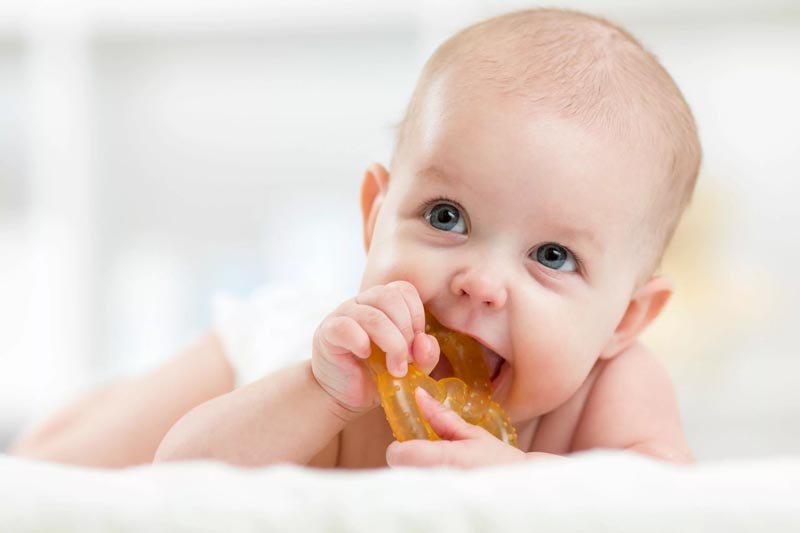Teething Babies Often Experience Pain and Discomfort

Having a baby is an exciting time for parents. They get to experience a world of new moments and opportunities. Many of a baby’s firsts are moments to be adored, such as their first word, first steps, and first tooth. Unlike the first two, when a baby grows their first tooth, it can create an uncomfortable and sometimes painful experience known as teething.
Babies often tend to begin teething when they are between 4-7 months old. Typically, their two bottom front teeth are the first to erupt. Then, their top front teeth follow after. The actual growth of the teeth doesn’t worry parents, but how it affects their baby does.
Teething Symptoms
Every child is different. Some babies do not begin teething until they are almost a year old while some begin much earlier. Many parents often believe that since their child is drooling, they are teething. While drooling is a symptom of teething, it does not mean teething has begun. Babies can show teething symptoms but not begin teething for several months.
However, there are some symptoms once a tooth has erupted or in the process of teething to be alert to, including:
- Dr.ooling
- Chewing or biting
- Sore or tender gums
- Fussiness or irritability
- Trouble sleeping
- Low-grade fever (less than 101 F)
These are all normal symptoms for teething babies. It is important to keep an eye on your child’s fever. Teething is not known to cause high fevers, so if your infant’s fever is over 102 F, then take them to their doctor immediately. You should also contact their doctor if they have diarrhea, vomiting, rashes, or a cough.
Teething Treatments
Once again, all babies are different. Therefore, they will all react differently to different treatments. You may have to try out several different soothing techniques to help your little one. However, if your baby is teething, and they appear uncomfortable, you can try these soothing treatments:
- Rubbing your baby’s gums. When a baby is teething, their gums are often very sore and tender. Use a clean finger to massage their gums. The pressure helps relieve the discomfort. If their teeth aren’t grown in yet, you can also let them gnaw on your finger.
- Let them chew something cool. Having something cold in your child’s mouth often helps soothe them. A cold pacifier, clean wet washcloth, or a solid, yet soft refrigerated teething ring or toy can be used. However, experts believe toys or things that are too cold or frozen may hurt the baby’s mouth.
- Clean away drool. It’s important to keep a clean, dry cloth nearby whenever your baby is teething. This process creates excessive drooling. Too much drool can lead to irritated skin and lips. Wipe your baby’s mouth and chin to prevent irritation.
- Use over-the-counter medication. Sometimes teething causes babies to be especially cranky and irritable. If your child is around 6 months old, you can use Tylenol or ibuprofen to ease their pain. Avoid the use of pain relievers containing benzocaine since it shouldn’t be given to children under 2 years old.
Caring for Baby Teeth
Ideally, you should clean your child’s new teeth with a recommended soft-bristled infant toothbrush daily. This helps keep bacteria from harming your child. Since your child doesn’t learn how to spit until the age of 3, only use a tiny amount of fluoride toothpaste. When they get around 2 or 3, a pea-sized drop of toothpaste can be used.
It’s also time to consider taking them for their first dental checkup. It is recommended to take your child to the dentist after their first tooth has come in. This allows you to learn more about caring for your child’s teeth while getting your child familiar with their dentist.
Teething often leads to cranky and irritated babies. While their symptoms aren’t continuous as they grow their teeth, it can still cause them discomfort. If you wish to learn more about soothing your child as they teeth or to schedule a pediatric dental checkup, give Cosmetic & Family Dentistry of Las Colinas a call.
- Awareness16
- Bad Breath1
- Bone Grafting1
- Braces4
- Causes, Symptoms, And Treatments6
- Cavities5
- Chewing Gum1
- Cosmetic Dentistry of Las Colinas15
- COVID-192
- Deep Cleaning7
- Dental Anxiety1
- Dental Bridge2
- Dental Care27
- Dental Cleaning6
- Dental Crown1
- Dental Filling1
- Dental Health24
- Dental Implants6
- Dental Sedation1
- Dental Visit1
- Dental X Ray3
- Floss1
- Gum Dieseases4
- Injury1
- Insurance1
- Invisalign8
- Oral Cancer1
- Oral Hygiene24
- Root Canal9
- Sleep Apnea2
- Tartar1
- Teeth19
- Thanksgiving1
- TMJ1
- Tongue1
- Veneers2
- White Teeth12
Get Your Best Smile With Us
